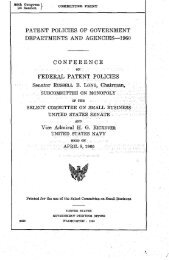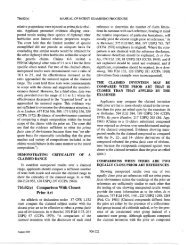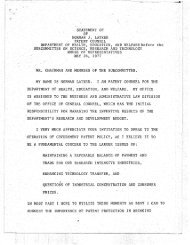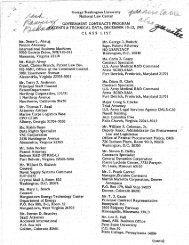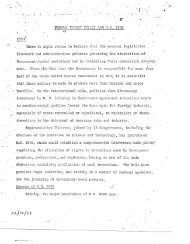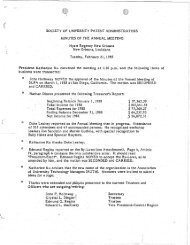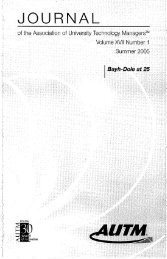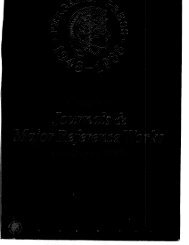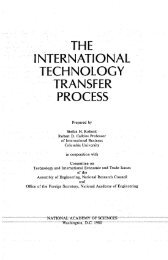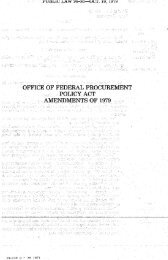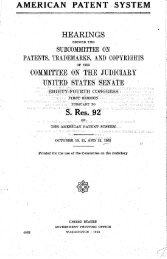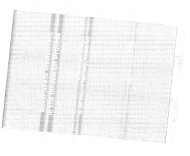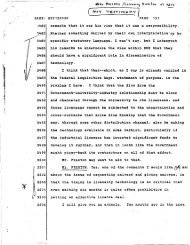Report of the Commission on Government ... - Bayhdolecentral
Report of the Commission on Government ... - Bayhdolecentral
Report of the Commission on Government ... - Bayhdolecentral
You also want an ePaper? Increase the reach of your titles
YUMPU automatically turns print PDFs into web optimized ePapers that Google loves.
28<br />
litigati<strong>on</strong> <strong>on</strong>ce it has reached <str<strong>on</strong>g>the</str<strong>on</strong>g> review level<br />
and to make whatever findings are required.<br />
They believe that <str<strong>on</strong>g>the</str<strong>on</strong>g> delay resulting from<br />
<str<strong>on</strong>g>the</str<strong>on</strong>g> requirement that <str<strong>on</strong>g>the</str<strong>on</strong>g> case be remanded to a<br />
busy board is too great a price to pay for<br />
maintaining <str<strong>on</strong>g>the</str<strong>on</strong>g> distincti<strong>on</strong> between factfinding<br />
and reviewing findings <str<strong>on</strong>g>of</str<strong>on</strong>g> law and is,<br />
fur<str<strong>on</strong>g>the</str<strong>on</strong>g>rmore, a waste <str<strong>on</strong>g>of</str<strong>on</strong>g> <str<strong>on</strong>g>the</str<strong>on</strong>g> readily accessible<br />
factfinding mechanism available in <str<strong>on</strong>g>the</str<strong>on</strong>g> court.<br />
O<str<strong>on</strong>g>the</str<strong>on</strong>g>rs believe that <str<strong>on</strong>g>the</str<strong>on</strong>g> present remand<br />
practice, since it involves primarily a referral<br />
for determinati<strong>on</strong> <str<strong>on</strong>g>of</str<strong>on</strong>g> quantum, is appropriate,<br />
since <str<strong>on</strong>g>the</str<strong>on</strong>g> boards are a forum where <str<strong>on</strong>g>the</str<strong>on</strong>g> agency<br />
<str<strong>on</strong>g>of</str<strong>on</strong>g>ficials can deal directly with <str<strong>on</strong>g>the</str<strong>on</strong>g> c<strong>on</strong>tractor<br />
and frequently negotiate a reas<strong>on</strong>able settlement<br />
without requiring a full hearing. The<br />
resp<strong>on</strong>sibility and authority for settlement is<br />
primarily in <str<strong>on</strong>g>the</str<strong>on</strong>g> agency, and a c<strong>on</strong>siderati<strong>on</strong><br />
<str<strong>on</strong>g>of</str<strong>on</strong>g> what is a reas<strong>on</strong>able c<strong>on</strong>tract adjustment<br />
requires <str<strong>on</strong>g>the</str<strong>on</strong>g> first-hand knowledge <str<strong>on</strong>g>of</str<strong>on</strong>g> those <strong>Government</strong><br />
<str<strong>on</strong>g>of</str<strong>on</strong>g>ficials resp<strong>on</strong>sible for administering<br />
<str<strong>on</strong>g>the</str<strong>on</strong>g> c<strong>on</strong>tract, especially <str<strong>on</strong>g>the</str<strong>on</strong>g> c<strong>on</strong>tracting <str<strong>on</strong>g>of</str<strong>on</strong>g>ficer.<br />
Finally, <str<strong>on</strong>g>the</str<strong>on</strong>g>re is c<strong>on</strong>cern that to permit <str<strong>on</strong>g>the</str<strong>on</strong>g><br />
courts to open <str<strong>on</strong>g>the</str<strong>on</strong>g> board record and admit new<br />
evidence <strong>on</strong> a particular factual questi<strong>on</strong> is to<br />
risk de novo review <str<strong>on</strong>g>of</str<strong>on</strong>g> o<str<strong>on</strong>g>the</str<strong>on</strong>g>r questi<strong>on</strong>s as well,<br />
since <str<strong>on</strong>g>the</str<strong>on</strong>g> bounds <str<strong>on</strong>g>of</str<strong>on</strong>g> such a hearing will be<br />
difficult or impossible to define.<br />
The present judicial review process does not<br />
c<strong>on</strong>tribute to speedy and ec<strong>on</strong>omical resoluti<strong>on</strong><br />
<str<strong>on</strong>g>of</str<strong>on</strong>g> disputes. The limitati<strong>on</strong>s and uncertainties<br />
appear to have increased emphasis <strong>on</strong> procedures<br />
that can have a resultant ping-p<strong>on</strong>g effect<br />
between <str<strong>on</strong>g>the</str<strong>on</strong>g> boards and <str<strong>on</strong>g>the</str<strong>on</strong>g> courts, while<br />
<str<strong>on</strong>g>the</str<strong>on</strong>g> substance <str<strong>on</strong>g>of</str<strong>on</strong>g> <str<strong>on</strong>g>the</str<strong>on</strong>g> case is largely ignored.<br />
This, al<strong>on</strong>g with <str<strong>on</strong>g>the</str<strong>on</strong>g> lengthy time period<br />
needed to initiate court acti<strong>on</strong> in <str<strong>on</strong>g>the</str<strong>on</strong>g> first<br />
place, can make a case stale since a board <str<strong>on</strong>g>of</str<strong>on</strong>g><br />
c<strong>on</strong>tract appeals may not be directed to reopen<br />
a case until several years after its initial decisi<strong>on</strong>.<br />
During such an interval, witnesses and<br />
records for both sides may be lost or become<br />
difficult to find.<br />
Although <str<strong>on</strong>g>the</str<strong>on</strong>g> boards <str<strong>on</strong>g>of</str<strong>on</strong>g> c<strong>on</strong>tract appeals<br />
should be streng<str<strong>on</strong>g>the</str<strong>on</strong>g>ned in ways that will c<strong>on</strong>tribute<br />
to making better records and decisi<strong>on</strong>s,<br />
we see no advantage in c<strong>on</strong>tinuing <str<strong>on</strong>g>the</str<strong>on</strong>g> rigid<br />
Wunderlich Act review standards and remand<br />
practice. The system would be more resp<strong>on</strong>sive<br />
to <str<strong>on</strong>g>the</str<strong>on</strong>g> interests <str<strong>on</strong>g>of</str<strong>on</strong>g> ec<strong>on</strong>omy and fair treatment<br />
if <str<strong>on</strong>g>the</str<strong>on</strong>g> courts were allowed discreti<strong>on</strong> to supplement<br />
<str<strong>on</strong>g>the</str<strong>on</strong>g> board record with additi<strong>on</strong>al<br />
Part G<br />
evidence where appropriate and to take appropriate<br />
acti<strong>on</strong> to resolve <str<strong>on</strong>g>the</str<strong>on</strong>g> dispute. This should<br />
not foreclose <str<strong>on</strong>g>the</str<strong>on</strong>g> discreti<strong>on</strong> to remand a case<br />
to an agency board <str<strong>on</strong>g>of</str<strong>on</strong>g> c<strong>on</strong>tract appeals. However,<br />
<str<strong>on</strong>g>the</str<strong>on</strong>g> delay and added expense resulting<br />
from a mandatory remand procedure is too<br />
great a price to pay. C<strong>on</strong>sidering <str<strong>on</strong>g>the</str<strong>on</strong>g> factfinding<br />
mechanism available in <str<strong>on</strong>g>the</str<strong>on</strong>g> judicial<br />
forums-particularly <str<strong>on</strong>g>the</str<strong>on</strong>g> Court <str<strong>on</strong>g>of</str<strong>on</strong>g> Claims-and<br />
<str<strong>on</strong>g>the</str<strong>on</strong>g> limited number <str<strong>on</strong>g>of</str<strong>on</strong>g> c<strong>on</strong>tract disputes that<br />
are litigated in <str<strong>on</strong>g>the</str<strong>on</strong>g> courts, revisi<strong>on</strong>s in <str<strong>on</strong>g>the</str<strong>on</strong>g><br />
standards for scope <str<strong>on</strong>g>of</str<strong>on</strong>g> review and remand<br />
should benefit both c<strong>on</strong>tractors and <str<strong>on</strong>g>the</str<strong>on</strong>g> <strong>Government</strong>.«<br />
District Court Jurisdicti<strong>on</strong><br />
Recommendati<strong>on</strong> 10. Increase <str<strong>on</strong>g>the</str<strong>on</strong>g> m<strong>on</strong>etary<br />
jurisdicti<strong>on</strong>al limit <str<strong>on</strong>g>of</str<strong>on</strong>g> <str<strong>on</strong>g>the</str<strong>on</strong>g> district courts to<br />
$100,000.*<br />
The Tucker Act was intended to create an<br />
integrated jurisdicti<strong>on</strong>al plan so that <str<strong>on</strong>g>the</str<strong>on</strong>g> Court<br />
<str<strong>on</strong>g>of</str<strong>on</strong>g> Claims and <str<strong>on</strong>g>the</str<strong>on</strong>g> U.S. district courts could<br />
<str<strong>on</strong>g>of</str<strong>on</strong>g>fer an equal opportunity for a fair trial <str<strong>on</strong>g>of</str<strong>on</strong>g><br />
like claims within <str<strong>on</strong>g>the</str<strong>on</strong>g> stated jurisdicti<strong>on</strong>al<br />
amount <str<strong>on</strong>g>of</str<strong>on</strong>g> <str<strong>on</strong>g>the</str<strong>on</strong>g> district courts. The act was<br />
intended in part to release <str<strong>on</strong>g>the</str<strong>on</strong>g> pressure put <strong>on</strong><br />
C<strong>on</strong>gress by individuals for private bills to<br />
terminate disputes. It also was intended to<br />
allow those with small claims to bring suit in<br />
<str<strong>on</strong>g>the</str<strong>on</strong>g> district in which <str<strong>on</strong>g>the</str<strong>on</strong>g>y and <str<strong>on</strong>g>the</str<strong>on</strong>g>ir witnesses<br />
resided without incurring <str<strong>on</strong>g>the</str<strong>on</strong>g> expense and inc<strong>on</strong>venience<br />
<str<strong>on</strong>g>of</str<strong>on</strong>g> litigati<strong>on</strong> in Washingt<strong>on</strong>.<br />
These remain valid reas<strong>on</strong>s for giving <str<strong>on</strong>g>the</str<strong>on</strong>g><br />
district courts a role in <str<strong>on</strong>g>the</str<strong>on</strong>g> disputes-resolving<br />
process, although in recent years that role has<br />
greatly diminished, largely because inflati<strong>on</strong><br />
has made <str<strong>on</strong>g>the</str<strong>on</strong>g> present jurisdicti<strong>on</strong>al limit <str<strong>on</strong>g>of</str<strong>on</strong>g><br />
$10,000 far too low. It is clear that this limit<br />
must be raised if <str<strong>on</strong>g>the</str<strong>on</strong>g> district courts are to<br />
play an effective role in <str<strong>on</strong>g>the</str<strong>on</strong>g> process.<br />
Expanding <str<strong>on</strong>g>the</str<strong>on</strong>g> district court jurisdicti<strong>on</strong> to<br />
$100,000 would broaden <str<strong>on</strong>g>the</str<strong>on</strong>g> base <str<strong>on</strong>g>of</str<strong>on</strong>g> <strong>Government</strong><br />
c<strong>on</strong>tract law by involving a greater<br />
52 Pub. L. No. 92-415, signed by <str<strong>on</strong>g>the</str<strong>on</strong>g> President in Sept. 1972,<br />
grants <str<strong>on</strong>g>the</str<strong>on</strong>g> court <str<strong>on</strong>g>the</str<strong>on</strong>g> power to remand with such "directi<strong>on</strong>s" as it<br />
may deem propel' and just. Our recommendati<strong>on</strong> would give <str<strong>on</strong>g>the</str<strong>on</strong>g><br />
court <str<strong>on</strong>g>the</str<strong>on</strong>g> additi<strong>on</strong>al power to take additi<strong>on</strong>al evidence itself instead<br />
<str<strong>on</strong>g>of</str<strong>on</strong>g> remanding, In additi<strong>on</strong>, Rep. Caller in May 1972 introduced a bill<br />
(H.R. 14726) that would amend <str<strong>on</strong>g>the</str<strong>on</strong>g> Wunderlich Act to grant <str<strong>on</strong>g>the</str<strong>on</strong>g><br />
c<strong>on</strong>tractor a de novo review <str<strong>on</strong>g>of</str<strong>on</strong>g> an adverse board decisi<strong>on</strong> with,<br />
however, <str<strong>on</strong>g>the</str<strong>on</strong>g> board decisi<strong>on</strong> heat-ing' a presumpti<strong>on</strong> <str<strong>on</strong>g>of</str<strong>on</strong>g> correctness.<br />
«gee dissenting positi<strong>on</strong>, infra.



